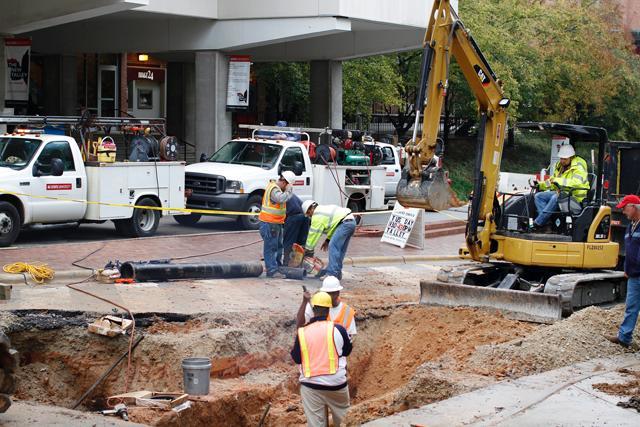Talley Student Center construction resulted in evening detours again last week, with buses not serving stops on Dunn, Morrill or Faucette from 6:30 p.m . to 6 a.m .
However, the N.C . State Transportation Office is working to make sure on-going construction and traffic decisions affect students as little as possible.
Christine Klein, public communication specialist for the NCSU transportation office, said every project goes through detailed design and construction planning long before a contract is bid through the State Construction Office.
“This whole process involves a detailed analysis of how the work is to be accomplished. And, for the most part, actual construction goes according to plan. The reality is that once the contractor gets boots on the ground, there usually are items or situations that arise that can change plans slightly,” she said.
On bus detours specifically, Klein said many of the decisions have the safety of workers in mind.
“A car may have been able to make it, but we knew a bus could not make it safely, and there are workers in the trenches,” Klein said. “It’s just a matter of trying to make things work as well as you can [while] maintaining safety and keeping the project moving forward. So we’ve had some evening detours.”
Most road closures the result of extensive planning and not random, according to Klein. She said the office reviews everything happening on campus before approval.
“The only person that can officially give the approval to close down a road on campus is our director Tom Kennedy. So, when you’re talking road closure, we require five days notice, but if it’s a planned road closure, we’re usually talking about it weeks in advance,” Klein said. “Flat out we tell contractors you can’t do anything during open house. If there are big events on campus, no work can be done.”
Other closures happen in response to emergencies, like water main breaks, and have nothing to do with Talley construction. This was the cause of the temporary Carmichael gym bus re-routes Oct. 18.
Bus riders are not the only people affected, however. Matthew Adams, a senior in computer science, lives off-campus and drives himself. He frequently parks in the Coliseum Deck and said the construction has affected his daily route.
“I have had to take a different route when the road behind the parking deck is closed,” Adams said. “Sometimes there are cars backed up along the street while we wait for a construction vehicle to move. It hasn’t been a huge issue for me, but it is quite an annoyance.”
For others, the construction has little effect on their routine. Derek Ward, a junior in mechanical engineering, says that the construction has never changed his bus route, so he has not paid much attention to updates on bus schedules.
According to Klein, in addition to the advanced planning, transportation tries to get the information about road closures to as many students as possible, although there are problems.
“We put it out on Wolf Bites. I send it to building liaisons. I have all these student contacts that then pass it on to their list servs . It is a lot easier to get it out to students on campus versus people who live off campus. There is a communication hole there that we have a hard time getting to. As part of our communication, we send our road closure information to CAT and Triangle Transit, and they have a call center so the people know,” she said.
However, Klein said that transportation is working to improve on the communication process and that they are always looking for student suggestions to spread the information further, particularly to those students living off campus.
“You might think it’s willy-nilly , but there is just a tremendous amount of planning that goes into it. We knew [the Talley project] was coming, and so we planned for it and acted accordingly,” Klein said.








